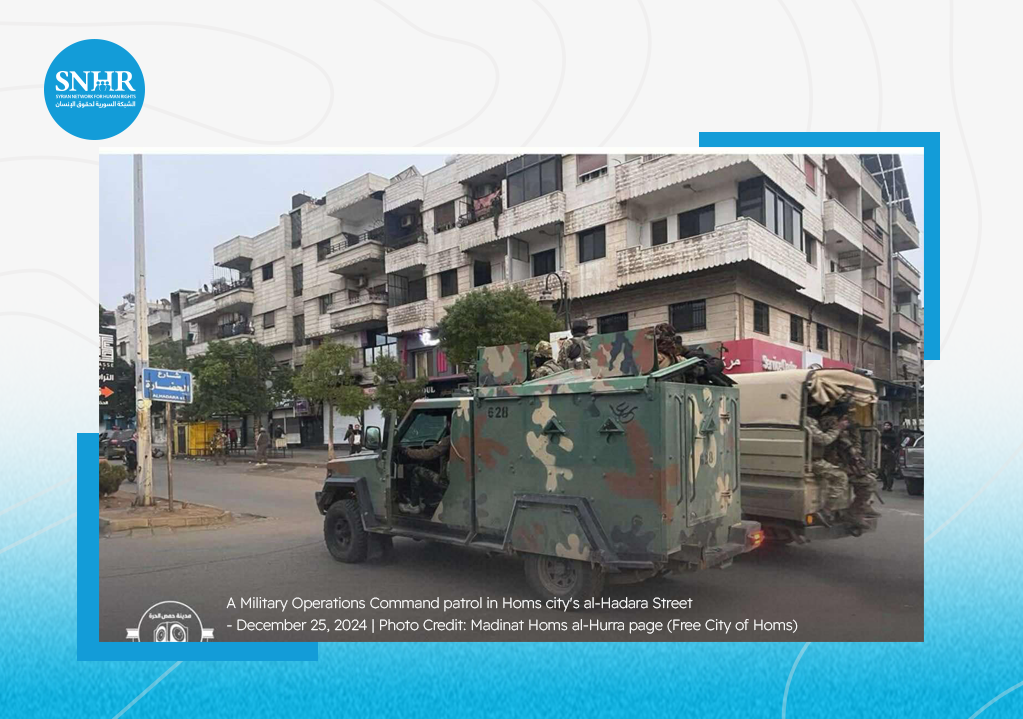Torture Poses a Threat to the Efforts to Extradite the Criminals of the Former Regime from their The Countries They Fled to

Available In
The Hague – December 30, 2024, the Syrian Network for Human Rights (SNHR) today released a statement noting that perpetrating degrading acts while arresting those accused of committing violations during the Assad regime’s rule as part of the ongoing wide security crackdown launched by the Military Operations Command in Syria against the remnants of the deposed regime to re-establish security and safety undermines the new government’s credibility. The statement adds that any acts of torture by the new authorities pose a threat to the efforts to extradite the criminal members of the former regime from the countries they fled to.
Security operations
Since the former regime was overthrown, security forces under the Military Operations Command have launched intensive sweeps in several areas, notably southern Latakia and the Starmakho district, in which several suspects were arrested, and large quantities of weapons and ammunition were confiscated. Security checkpoints were also established at critical locations, such as the road to the Hmeimim Military Base, to monitor movements to and from some areas. This campaign also targeted areas such as Qedsayya, Al-Hama, and Jabal al-Ward in rural Damascus, in an effort to curb the proliferation of illegal weapons and prevent security breaches.
Armed clashes
In response to the campaign, armed militias affiliated with the deposed Assad regime launched attacks on security patrols of the new Military Command. These attacks occurred in several locations across Tartus and Latakia governorates, including Khirbet Al-Ma’azza village in rural Tartus, and Talkalakh and Balkasa in rural Homs. The clashes resulted in the deaths of 17 security personnel and the burning of their vehicles. The statement stresses that SNHR strongly condemns the targeting of security forces and calls for enhanced preventive measures to ensure their safety.
Violations related to the treatment of detainees
The statement reveals that, in the course of these campaigns, videos, apparently filmed by members of the Military Operations Command, circulated online, showing the arrests of some individuals suspected of committing severe human rights violations during the Assad regime’s rule. These videos depict detainees being subjected to physical and psychological abuse, including beatings and degrading treatment.
Negative impact on transitional justice
The statement adds that, while pursuing perpetrators of human rights violations is undoubtedly essential for justice and accountability, SNHR emphasizes that continuing such practices of humiliation and abuse risks undermining the transitional justice process.
Such violations erode trust in the new judicial system, fuel feelings of vengeance and division within society, and hinder efforts toward national reconciliation and rebuilding the social fabric.
Impact of torture on extraditing criminals from the countries to which they fled to Syria
As the statement further explains, the use of torture and humiliation by the new authorities in Syria could undermine efforts to extradite the former dictator Bashar Assad and officials from his regime implicated in crimes against humanity who have fled the country.
Countries generally base extradition decisions on the legal and ethical standards applied by the judicial system of the states requesting extradition. Evidence of torture or mistreatment may lead to the rejection of extradition requests, complicating international accountability efforts and hindering justice.
Furthermore, the statement provides a number of recommendations to the current authorities in Syria regarding the treatment of detainees during and after arrest.
During Arrest
- Use of Force
- Force should be used only as a last resort, proportionately, when necessary, and within legal bounds.
- De-escalation methods should be prioritized over excessive or punitive measures.
- Communication and explanation
- Authorities must promptly inform detainees of the reasons for their arrest and their rights, including the right to legal representation.
- Non-Discrimination
- All procedures should be carried out without discrimination based on race, religion, gender, or political views, respecting the dignity and human rights of detainees.
After arrest
- Humane Treatment
- Detainees’ dignity and rights must be respected during detention.
- Detention conditions should adhere to international standards, including adequate food, water, healthcare, and hygiene facilities.
- Legal representation
- Detainees must have immediate access to legal representation and be presented before an independent judicial authority for a review of legality of their detention
- Rehabilitation
- Upon release, detainees should be provided with healthcare and psychological, and social support services, as well as assistance in reintegrating into society and reuniting with their families.


